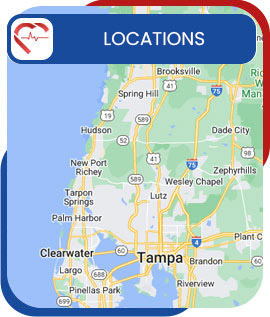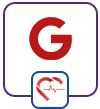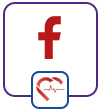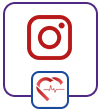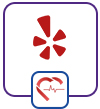Is It Allergies or Sinusitis? Understanding the Difference
Sinusitis and allergies have similar symptoms, making it difficult to differentiate between them. Allergies result in inflammation as the immune system overreacts to external stimuli, whereas viruses like colds cause sinusitis, a sinus infection. The symptoms of allergies include a runny nose, itchy eyes, nose and throat inflammation, and sneezing. Symptoms of sinusitis include fever, weariness, headaches, sinus congestion, coughing, and facial pain. Whether you are suffering from sinusitis or allergies at Urgent Care & Wellness Center, our specialists offer treatments to help you. For more information, contact us or book an appointment online. We accept walk-ins. We serve patients from Lutz FL, New Port Richey, FL, and surrounding areas.


Table of Contents:
How do you know if I have a sinus infection or allergies?
How are sinus infection symptoms different from allergies?
How do allergists diagnose whether it’s sinus infections or allergies?
Can sinus infections be common with allergies?
When to go to an allergist for sinus infections and allergies?
The symptoms of sinus infections and allergies can be similar, making it difficult to tell the difference between the two. They both have some strong differences. Sinus infections often include thick yellow or green nasal discharge, fever, and facial pain or pressure. On the other hand, allergies are often accompanied by clear nasal discharge, sneezing, and itchy or watery eyes. If you can’t tell what kind of symptoms you are having, it is imperative to see a healthcare professional for the right diagnosis and treatment.
Sinus infections and allergies can have overlapping symptoms, making it difficult to distinguish between the two. However, there are some key differences to look out for.
Sinus infections are typically accompanied by a fever, facial pain or pressure, and a green or yellow nasal discharge. The mucus may also be thick and have a bad odor. In addition to nasal congestion, individuals with a sinus infection may experience a cough, sore throat, and fatigue.
On the other hand, allergies are often characterized by itchy or watery eyes, sneezing, and a runny nose with clear mucus. The symptoms may also be seasonal, with individuals experiencing more pronounced symptoms during certain times of the year.
The right diagnosis will help you decide on the best treatment plan for you, which may include over-the-counter medications, prescriptions, or other treatments or therapies based on the specific cause of your symptoms.
Allergists can diagnose whether it’s sinus infections or allergies through various methods. They may start with a physical examination of the nasal passages, sinuses, and throat. The allergist may also ask about your symptoms and medical history. Additionally, the allergist may recommend allergy testing to determine if you have specific allergies that may be causing your symptoms. If the allergist suspects a sinus infection, they may order a CT scan or recommend a referral to a specialist of the ear, nose, and throat for more testing. Ultimately, the diagnosis will depend on the specific symptoms and findings from the examination and any tests that are performed.
Yes, sinus infections can be common with allergies. When you have allergies, your body’s immune system overreacts to allergens like pet dander, pollen, dust mites, or foods. This can cause inflammation in your sinuses, which can make them more susceptible to bacteria growth and cause a sinus infection. Additionally, the excess mucus produced by your body in response to allergens can also contribute to the development of a sinus infection. If you are experiencing signs of a sinus infection, you will need to see a healthcare provider for the right diagnosis and treatment.
Sinus infections can be caused by a few different things, including allergies. If you are experiencing chronic or recurrent sinus infections, it may be worth visiting an allergist to determine if your condition may be related to allergies. An allergist can perform tests to determine if your symptoms are due to an underlying allergy, such as dust mites, pollen, or pet dander. They will also make a treatment plan with you to manage your symptoms and prevent future sinus infections.
Similarly, if you are experiencing allergy symptoms such as sneezing, runny nose, and itchy eyes, an allergist can help diagnose the specific allergen triggering your symptoms. Allergy testing can identify the allergens you react to, which gives you the chance to fight them. Additionally, an allergist can recommend medications or immunotherapy to treat your allergies and bring life to your life again.
It’s also a good idea to see an allergist if you have reoccurring severe allergic reactions or anaphylaxis. An allergist can guide you on how to manage your allergies and avoid potentially life-threatening reactions. They can also prescribe emergency medications, such as epinephrine, and recommend strategies to reduce your risk of exposure to allergens. Contact us for more information about our services, schedule an appointment online, or visit our clinic for a walk-in appointment. We serve patients from Lutz FL, New Port Richey FL, Land O’ Lakes FL, Cheval FL, Greater Northdale FL, Greater Carrollwood FL, River Ridge FL, Seven Springs FL, Port Richey FL, Bayonet Point FL, Hudson FL, and Elfers FL.

Additional Services You May Need
▸ Urgent Care
▸ COVID Testing
▸ Illness
▸ Injuries
▸ X-Rays & Labs
▸ Sports Physicals
▸ Employment Physicals
▸ Occupational Medicine

Additional Services You May Need
▸ Urgent Care
▸ COVID Testing
▸ Illness
▸ Injuries
▸ X-Rays & Labs
▸ Sports Physicals
▸ Employment Physicals
▸ Occupational Medicine

